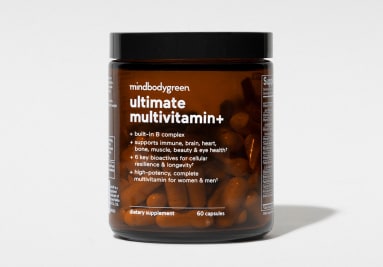
Image by Ivan Gener / mbg creative
August 5, 2023
Our editors have independently chosen the products listed on this page. If you purchase something mentioned in this article, we may
When it comes to nutrition and movement, there are many exciting activities and foods we can begin to incorporate into our daily lives. And who’s better at revamping habits and routines than experts from the Mayo Clinic? These expert-recommended and research backed tips aren’t about discipline or depravation. They’re accessible lifestyle changes that help you feel your best.
Advertisement
This ad is displayed using third party content and we do not control its accessibility features.
What is the Mayo Clinic Diet?
First things first: I’ll let Donald D. Hensrud, M.D., M.S., medical director for the Mayo Clinic Healthy Living Program, explain what the Mayo Clinic Diet is, exactly.
“It’s not only about weight and it’s not really a diet—it’s a lifestyle change program that emphasizes healthy weight management and healthy eating,” says Hensrud. “It’s about health and beneficial lifestyle habits.”
Even if you’re already familiar with the Mayo Clinic Diet, you may not have heard that it recently underwent a pretty massive upgrade and now includes a variety of meal plans to accommodate a range of dietary patterns (including Mediterranean, vegetarian, higher protein, and keto). This variety of meal plans is just one way that the Mayo Clinic Diet recognizes fad, one-size-fits-all approaches to healthy body composition aren’t realistic or practical.
As Hensrud noted, the name “Mayo Clinic Diet” can be deceiving—this isn’t a “diet” but rather a new outlook on health and well-being. The program’s mission is to introduce healthy habits that will create sustainable change and inspire healthy body composition and long-term well-being.
Building a sustainable lifestyle
The thing is this: Sticking to new habits is hard, and breaking old ones can be even tougher. “In general, we like to talk to people about making baby steps and building on them,” says Hensrud. This goes for all goals (health, career, etc.)—it’s important not to overwhelm yourself from the start.
Nutritionist and New York Times bestselling author JJ Virgin, CNS, BCHN, said it best in her recent mbg article: “Well-being doesn’t happen overnight. When you tackle everything at once, you’re most likely going to get burned out and ditch the entire process.” (Read Virgin’s tips for creating a personalized wellness routine that’s actually sustainable here.)
“One of the mistakes people make is they are too rigid in their approach to changing their diet,” notes Hensrud. “They go ‘on’ a diet, which means they’re gonna go ‘off’ a diet.” When you’re trying to facilitate long-term change, this mindset simply doesn’t work.
Jennifer Welper, wellness executive chef at the Mayo Clinic Healthy Living Program and author of Cook Smart, Eat Well, likes to promote sustainability and consistency to make healthy cooking (and eating) more effective. “Truly, it’s just about creating the environment for you to be successful,” she says.
Advertisement
This ad is displayed using third party content and we do not control its accessibility features.
7 ways to upgrade your health
Like most things in life, half the battle with incorporating healthier habits (whether exercise-focused, nutritional, or otherwise) is simply convincing your brain that it’s not going to be a miserable process. “It’s not as bad as what people think,” Hensrud notes. Once they start seeing results, they feel better and it becomes an empowering process.
1. Shop local
Besides good ambiance and abundance of samples, shopping local via farmers markets comes with some health benefits. “I think farmers markets are wonderful,” says Hensrud. “‘It’s locally grown food. It’s fresh, so it has more nutrients and tastes better. It supports the local economy. It gives people new ideas when they have new foods,” he adds.
Visit your local farmers market or sign up for a Community Supported Agriculture program (aka CSA) to get delicious, fresh produce in your region.
Advertisement
This ad is displayed using third party content and we do not control its accessibility features.
2. Eat seasonally
3. Opt for natural sugars
Hensrud recommends swapping conventional sugar for fresh fruit to up your micronutrient intake. (With how delicious sweet, juicy fruit tastes on a warm day, this tip is a win for your taste buds and whole-body health.)
Advertisement
This ad is displayed using third party content and we do not control its accessibility features.
4. Take your daily multi
Meeting your nutritional needs is an every day, year-round affair. No matter the season, taking a comprehensive and high-quality daily multi (like mbg’s ultimate multivitamin+) helps ensure you’re closing nutrient gaps that you might be missing from your food.
Certain micronutrients—like vitamin D—are nearly impossible to get enough of through your diet, even if you’re eating all those fresh, nutritious veggies!
Advertisement
This ad is displayed using third party content and we do not control its accessibility features.
5. Set yourself up for success
Welper suggests treating your fridge like a gas station—have precut veggies, dips, and easy leftover meals like veggie-packed frittatas ready to grab and go without thinking. “Prep two days a week so the rest of the days you can just assemble and execute,” she says.
6. Move in enjoyable ways
Add 30 minutes of movement to your day, but don’t put pressure on which activities to do or what your “exercise plan” should look like. “People don’t have to train for a marathon or do anything they don’t like, but just getting out on the block when it’s nice outside—walking is great,” says Hensrud.
7. Get outside!
When it comes to optimizing immune function, longevity, mental health, and more, nature is one of the most powerful and accessible tools we have at our disposal. If you live in a city, not to fear—a 2021 EPJ Data Science study found that simply being in a green space (like a park with trees or a garden) helps people feel happier and more relaxed.
The takeaway
“Eating well and managing weight doesn’t have to be drudgery,” notes Hensrud. “‘It can and should be a very enjoyable way to live.”
Spring is a time of renewal, and there’s no reason that energy shouldn’t transfer to your healthy habits! Try incorporating these tips to promote healthy body composition and enhance your overall well-being.
If you are pregnant, breastfeeding, or taking medications, consult with your doctor before starting a supplement routine. It is always optimal to consult with a health care provider when considering what supplements are right for you.


